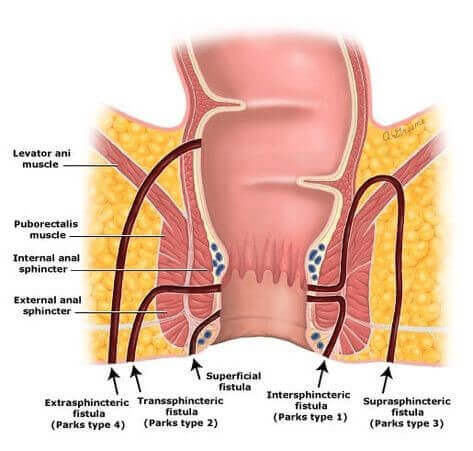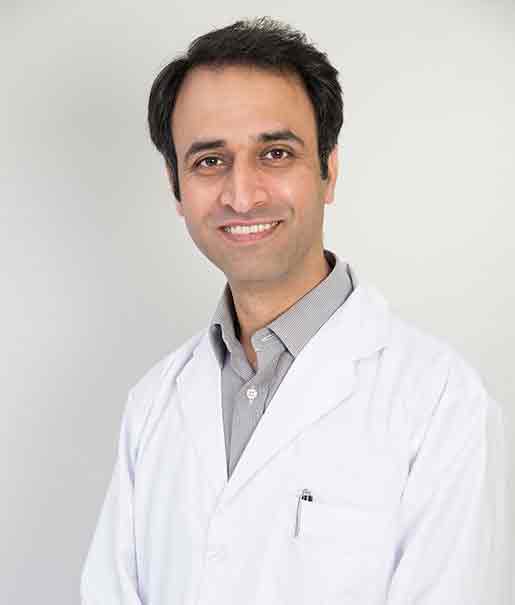Anal Fistula Treatment
An anal fistula (Bhagandar) is a small tunnel that develops between the end of the bowel and the skin near the anus. They're usually the result of an infection near the anus causing a collection of pus (abscess) in the nearby tissue. When the pus drains away, it can leave a small channel behind. Anal fistulas can cause unpleasant symptoms, such as discomfort and skin irritation, and won't usually get better on their own. Surgery is recommended in most cases.

What are the symptoms of anal fistula?
Symptoms of an anal fistula can include:- Skin irritation around the anus
- Constant, throbbing pain that may be worse while sitting down, move around, having a bowel movement or while coughing.
- Smelly discharge from or near anus
- Passing pus or blood while passing stools.
- Swelling and redness around your anus and a high temperature (fever), if you also have an abscess
- Difficulty controlling bowel movements in some cases
- The end of the fistula might be visible as a hole in the skin near anus, although this may be difficult for patients to see.
What are the causes of anal fistulas?
Most anal fistulas develop after an anal abscess. They can occur if the abscess doesn't heal properly after the pus has drained away.
It's estimated that between one in every two to four people with an anal abscess will develop a fistula.
Less common causes of anal fistulas include:
- Crohn's disease – A long-term condition in which the digestive system becomes inflamed
- Diverticulitis – Infection of the small pouches that can stick out of the side of the large intestine (colon)
- Hidradenitis suppurativa – a long-term skin condition that causes abscesses and scarring Infection with tuberculosis (TB) or HIV
When to get medical advice?
Visit Experienced Laser Proctologist or Surgeon if you have persistent symptoms of an anal fistula.
Who is a Proctologist : Proctologist is a medical doctor and surgeons who diagnose and treat disorders related to the rectum, anus, and entire gastrointestinal tract.Filling placement is necessary to treat cavities and prolong the longevity of the natural teeth. With today’s technology continuously improving, new methods are developed to benefit the patients and ensure their positive oral health for a lifetime.
Our Fistula Surgeons
Dr. Mir Asif Rehman
DNB - General Surgery
General and Laparoscopic Surgeon & Proctologist
Book Consultation
Dr Lalmalsawma Ralte
M.B.B.S, M.S (General Surgery), F.I.A.G.E.S, F.A.L.S
General and Laparoscopic Surgeon & Proctologist
Book ConsultationHow is Fistula diagnosed?
Fistula is diagnosed by examining anus and gently insert a finger inside to check for signs of a fistula.
Proctoscopy – where a special telescope with a light on the end is used to look inside your anus Magnetic resonance imaging (MRI) scan may be ordered to know the full extent of the disease.
Treatments for an anal fistula
Anal fistulas usually require surgery as they rarely heal if left untreated. All these procedures have different benefits and risks. The best option for you will depend on the position of your fistula and whether it's a single channel or branches off in different directions. We will talk to you about the options available and which one they feel is the most suitable for you. Surgery for an anal fistula is usually carried out under general anesthesia. The aim of surgery is to heal the fistula while avoiding damage to the sphincter muscles, the ring of muscles that open and close the anus, which could potentially result in loss of bowel control bowel incontinence).
The most common type of surgery for anal fistulas is a fistulotomy. This involves cutting along the whole length of the fistula to open it up so it heals as a flat scar. A fistulotomy is the most effective treatment for many anal fistulas, although it's usually only suitable for fistulas that don't pass through much of the sphincter muscles, as the risk of incontinence is lowest in these cases. If your surgeon has to cut a small portion of anal sphincter muscle during the procedure, they will make every attempt to reduce the risk of incontinence. In cases where the risk of incontinence is considered too high, one of the procedures below may be recommended instead.
If your fistula passes through a significant portion of anal sphincter muscle, your surgeon may initially recommend inserting a seton. A seton is a piece of surgical thread or wire that is left in the fistula for several weeks to keep it open. This allows it to drain and helps it heal, while avoiding the need to cut the sphincter muscles. Loose setons allow fistulas to drain, but don't cure them. To cure a fistula, tighter setons may be used to cut through the fistula slowly. This may require several procedures that we can discuss with you.
The ligation of the intersphincteric fistula tract (LIFT) procedure is a relatively new treatment for anal fistulas. It's designed as a treatment for fistulas that pass through the anal sphincter muscles, where a fistulotomy would be too risky. During the treatment, a cut (incision) is made in the skin above the fistula and the sphincter muscles are moved apart. The fistula is then sealed at both ends and cut open so it lies flat. This procedure has had some promising results so far, but it's only been around for a few years, so more research is needed to determine how well it works in the short and long term.
It is very simple operation. It doesn’t need any advanced technology. Under the effect of low spinal anesthesia, internal opening is defined. Gently a pliable probe is passed through external opening and taken out of the anus.
A small incision given near internal opening, little dissection done around the probe and an aneurism needle passed to take suture around the indwelling probe. Probe removed and suture tied flush to internal opening.
- Tract transacted and distal component cored out. Anal wound closed. External wound is left open.
- No post op wound packing or dressings are required.
- Sitz bath and application of petrolatum jelly by patient himself.
- Weekly follow up, till the wound heals.
Fistula laser closure is a novel sphincter-saving procedure for the treatment of anal fistula. Primary closure of the track is achieved using laser energy emitted by a radial fiber connected to a laser. The energy causes shrinkage of the tissue around the radial fiber with the aim being to close the track.
Risks of anal fistula surgery
Like any type of treatment, treatment for anal fistulas carries a number of risks. The main risks are:
- Infection – this may require a course of antibiotics; severe cases may need to be treated in hospital
- Recurrence of the fistula – the fistula can sometimes recur despite surgery
- Bowel incontinence – this is a potential risk with most types of anal fistula treatment, although severe incontinence is rare and every effort will be made to prevent it
What Happens After Anal Fistula Surgery?
- Discomfort after fistula surgery can be mild to moderate for the first week and can be controlled with pain pills.
- The amount of time lost from work or school is usually minimal.
- Soaking the affected area in warm water (sitz bath) is recommended two or three times a day.
- Stool softeners or a bulk fiber laxative may also be recommended.
- It may be necessary to wear a gauze pad or mini-pad to prevent the drainage from soiling clothes.
- Bowel movements will not affect healing.
Why Choose Mirascare Clinic for Laser Fistula Treatment in Gurgaon?
- Dr Mir Asif Rehman is the only doctor within Gurgaon & Delhi NCR which uses Diode Laser 1470nm 15W and which is the most latest & advanced Laser Fistula Treatment in the world currently.
- Our Surgeon Dr. Mir Asif Rehman a Anal Fiatula Specialist Doctor has undergone an extensive training internationally on this advnaced laser techniques.
- Surgical Process is almost painless.
- There are no incisions
- No sutures, open wounds and bleeding;
- Very Less complications that occur with this advanced techniques
- Return to daily activities is possible after a very short time; Very fast recovery compare to old Open Surgery.
- We understand and believe that the Patient Care for Fistula Surgery better than anyone else.
- No waiting time, Book an appointment Now with our specialist surgeon and book your day of Treatment at the earliest.
- Cost of the Laser Anal Fistula Treatment is Comparatively less and the treatment is very effective.



